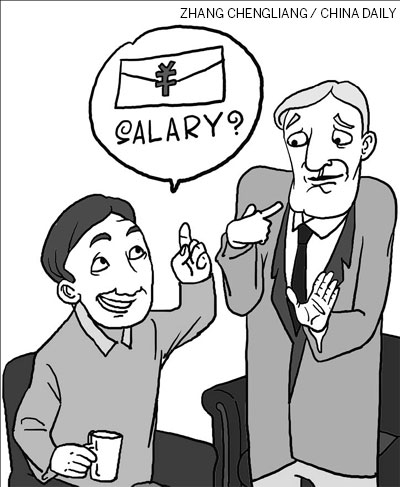

After all the years I have spent straddling Chinese and Western spheres in Beijing - snacking on sketchy street food like a local or hunting down the perfect French manicure like a picky New Yorker - you would think I've gotten used to the cross-cultural complaints.
No. It still drives me a little cuckoo when expatriates "love-hate" on Beijing. I, too, am guilty of ragging on life in the capital sometimes, rolling my eyes to the ceiling as I describe to foreign friends how I toss my "poking your elbow into my rib isn't going to make this subway car any more spacious for either of us" look to aggressive commuters.
But some people never give it a break. From dowdy "Chinese fashion" to a dearth of fine blue cheeses, to them there are apparently so many things wrong with Beijing that it makes me want to ask, "Why don't you just move?"
This is Beijing. Not London, not Paris, and certainly not Kansas. There are some things that you'll just have to get used to and stop complaining about.

First, yes, service sucks. There are plenty of international entertainment venues around, but just because they look like what you might see back home doesn't mean you are back home. The average waitstaff here gets paid a fraction of what a preteen earns delivering newspapers for an hour in an American suburb. The people trying to service you at restaurants and bars probably learned the little English that they do speak by memorizing menus at night, in a cramped dormitory room they share with four others from their home province. Don't expect them to anticipate your needs the way a seasoned maitre d' would. Instead, try to appreciate that they just brought you a New York-style brunch for $8, not $30.
Second, people will stare. While Beijingers have been used to seeing foreigners around the university and embassy districts for decades, remember that nearly one-third of the city's population is classified as "outsiders", mostly mobile migrant workers. (And this is the official estimate). Landing in the big city from the provinces, these lower-income residents are liable to stare at anybody who looks well-heeled and different, Chinese or otherwise. If it bothers you that much to be the object of someone's harmless curiosity, try wearing big shades and practice looking straight ahead. Or, get comfortable with returning the gaze with a smile - it's the quickest way to disarm a stare.
Third, the lines do get out of control. Basic courtesies seem like they should be second nature, but the more well-to-do would do better to remember that it's hard to understand the "scarcity mentality" unless you've lived through it. The people who are pushing and cutting in front of you in line have been conditioned to behave this way from living through a time when letting others go first meant being first in line right when food rations ran out. Or, perhaps they were raised by parents or grandparents who experienced this. In another 15 years - if it even takes that long - these ingrained behaviors will have caught up to the more ample circumstances a Chinese person now enjoys. In the meantime, if it really upsets you, just take a cab.
Fourth, prying is a part of life. When I was little, every parent of a student in my first-grade class worked in the same State-owned enterprise, lived in identical government-issue apartments, and made uniformly egalitarian salaries down to the decimal point. Discussing personal finances wasn't taboo - there were simply no secrets. With the rise of private enterprise and income stratification, the wealthier have become understandably touchy about the blunt questioning of their poorer neighbors.
Foreigners especially attract income speculation, for the local people they encounter are bewildered by their small displays of extravagance - say, using disposable Ziploc bags and shelling out big bucks for antiques. When you encounter "rude" inquiries, just follow this simple rule I overheard from an expatriate with the right attitude: "It may be the Chinese custom to ask, but it's not my custom to tell."
Lastly, eating Chinese food in China is the norm. I'm impressed by the selection of foreign foods available in Beijing, from Hungarian restaurants to grocery stores carrying imported brands. Yet, my fellow expatriates continue to bemoan the lack of good cheeses, wines, crackers, whatever you-name-it, in China. A common line heard around dinner time is "I don't want local Chinese food again!" But is there really such a thing as "Chinese food" in China? If you took the time to explore the bewildering selection of regional cuisines, you'll find tremendous differences in the subtly sophisticated fares of the south, the potently spicy dishes of the west, the hearty staples of the north, and the patiently concocted creations of the east. Rather than seek out what's not here, why not do the smarter, easier thing - eat local?